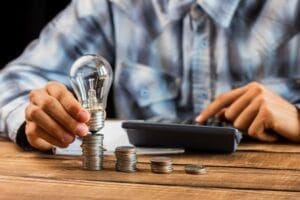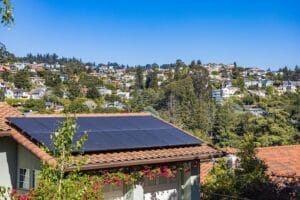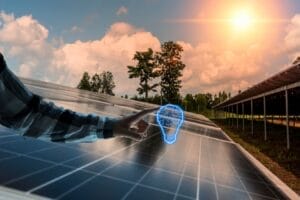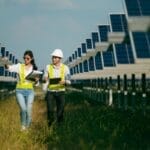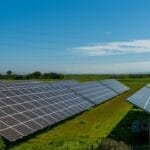There’s a lot of confusion and misinformation out there about solar energy. Some people swear by it, while others dismiss it as a fad. But the truth is, solar energy is like a jigsaw puzzle. And I’m here to help you put the pieces together and see the big, beautiful picture it forms.
Main Points
- Yes, solar panels can save you money. The average home can expect to pay between $10,000 and $30,000 after incentives.
- Solar energy systems are designed to work efficiently in a variety of weather conditions, including cloudy and snowy days.
- With the right setup, solar panels can provide a steady source of energy, even when the sun isn’t shining.
- Investing in solar energy can lead to significant savings on utility bills and can increase the value of your property.
- Advancements in solar technology have made panels more efficient and more affordable than ever before.
Debunking Solar Energy Misconceptions
Breaking Down the Cost Myth: Solar is Affordable
Let’s start with the biggest misconception: the cost. It’s easy to think that solar panels are a luxury only the eco-elite can afford, but that’s outdated thinking. The truth is, the cost of solar panels has dropped by about 70% in the last decade. That’s a significant decrease! And when you factor in government incentives and financing options, going solar is more like snagging a great deal at your favorite store than making a high-end purchase.
First and foremost, let’s discuss the figures. The typical solar panel system for a residence might cost anywhere from $15,000 to $25,000 before incentives. After you take advantage of federal tax credits and local rebates, the cost can drop to $10,000 to $17,500. And here’s the best part: those panels will start saving you money immediately by reducing your electric bills. Over time, they can even generate income if you produce more power than you need and sell it back to the grid. That’s a brilliant investment!
Weather Conditions and Solar Panel Efficiency
Let’s address the weather-related concerns next. Some people may argue that solar panels are not effective in cloudy or cold climates, but that’s not entirely true. Solar panels don’t need to be under the scorching sun to function; they just need light. Interestingly, they operate more efficiently in cooler temperatures. While their output may decrease slightly on cloudy days, they will still produce energy.
Here’s the reality: solar panels are similar to marathon runners – they’re built for the long game. They are engineered to endure a range of weather circumstances and keep on going. So, whether you live in sunny California or overcast Michigan, solar panels can convert the sky’s changing moods into steady energy for your house.
Take Germany for instance, it’s not particularly known for its sunny climate, yet it’s leading the way in solar energy. If they can make it work, so can you!
So, don’t let a bit of cloud cover put you off your solar ambitions. With the right technology and planning, your solar panels will keep your lights on and your carbon emissions low, whatever the weather.
What’s the Real Deal with Solar Energy Production?
Now, let’s talk about the reliability of solar energy. The sun is pretty reliable, rising and setting each day, but what happens when it’s not shining? That’s where solar batteries and the grid come into play. Batteries can store energy produced during the day for use at night, ensuring that your home stays powered after dark. And if you’re connected to the grid, you can often sell excess energy back during the day and pull from the grid when needed. It’s like having a bank account for your electricity.
Additionally, the production of solar energy isn’t a black and white matter. Even when it’s cloudy, your panels will still generate power, albeit at a diminished capacity. And over the span of a year, the number of sunny days usually outweighs the number of overcast ones, which evens things out. Furthermore, thanks to improvements in panel technology, they’re becoming increasingly efficient at harnessing scattered light on cloudy days.
Consider this: even on a rainy day, you can still get things done, can’t you? Your solar panels are no different.
Thus, with a solar system that’s the right size and properly set up, you don’t need to worry about losing power. Solar energy is reliable, and with each sunrise, you’re investing in a resource that’s always on schedule.
Dispelling Myths about Solar Energy
Increased Efficiency and Accessibility
One of the most amazing aspects of solar energy today is its increasing accessibility and efficiency. Unlike the bulky and inefficient solar panels of the past, today’s solar panels are streamlined, powerful, and ready to work for you. They have higher efficiency rates, meaning they can convert more sunlight into electricity, so you need fewer panels to meet your energy needs.
Let’s talk about how you can start using them. Solar energy is no longer a niche industry; it’s mainstream and expanding. You have a variety of options, from buying outright to leasing, and even community solar programs that allow you to benefit from solar energy without having to install a single panel on your property.
- Look into solar incentives in your local area to reduce initial costs.
- Think about your energy requirements to figure out the size of the solar system you need.
- Look into leasing and community solar if buying is not a possibility for you.
Most importantly, solar energy is not just about the technology; it’s about the community. There’s a whole ecosystem of installers, enthusiasts, and support systems ready to welcome you to the sunny side of the street.
Decoding the Lifespan of Solar Panels
If you’re considering making the switch to solar, you might be curious about how long those panels on your roof will last. Here’s some encouraging news: solar panels are built to last. Most come with a warranty of 25 to 30 years, and they can continue to function for years beyond that. While they may lose a bit of efficiency over time – about 0.5% per year is typical – they’re still going to be generating a substantial amount of power for many years.
Moreover, solar panels need minimal upkeep. They have no moving parts that can break down, and they are built to endure the weather. A small amount of cleaning occasionally to get rid of dust or snow is typically all that is needed to keep them in optimal condition.
Therefore, when you purchase solar panels, you’re not merely purchasing a product. You’re investing in a long-term energy solution. It’s a decision that will provide you with savings and peace of mind for many years.
How Solar Investment Affects Your Utility Bills
Let’s cut to the chase: what does going solar mean for your monthly budget? After the initial investment, the cost of solar energy is essentially the cost of the equipment and installation. Once that’s paid off, the energy your panels generate is free. This means you can see a significant decrease in your monthly utility bills, often by 50% to 100% depending on your system and energy use.
In many places, net metering policies allow you to sell any excess energy your system produces back to the grid. This can lower your energy bill and even bring in some extra cash. It’s as if your roof is operating a small business while you go about your daily routine.
So, putting your money into solar is a wise financial decision that can result in substantial savings over the long term. It’s a method to secure low energy expenses and safeguard yourself from increasing utility prices in the future.
Unveiling the Advantages of Solar Energy
It’s time to illuminate the broader advantages of solar energy. We’ve already discussed the individual benefits, but the impact of your solar decision reaches well beyond your own property line.
First and foremost, solar energy is clean and eco-friendly. By using the sun’s power, you’re lessening your dependence on fossil fuels, which results in less pollution and a reduced carbon footprint. It’s a proactive step you can take to fight climate change and preserve the environment for future generations.
- Lessening dependence on fossil fuels.
- Lowering pollution and greenhouse gas emissions.
- Playing a role in the battle against climate change.
Plus, there’s the feel-good factor. There’s a deep sense of satisfaction in knowing that the energy that powers your home is coming from a clean and renewable source. It’s a daily reminder that you’re part of the solution, not the problem.
The Environmental Benefits of Solar Power
Going solar is a clear choice for the environment. When you use solar power, you reduce the amount of harmful emissions that are released into our atmosphere. This leads to cleaner air, water, and soil, and a healthier planet. It’s a great way to give back to the environment.
What’s more, solar energy is endlessly renewable. The sun isn’t about to stop shining, and every kilowatt-hour of solar power used is one less taken from limited resources like coal and natural gas. It’s a sustainable choice that ensures we’re not exhausting the Earth’s natural resources.
As a result, solar energy not only helps the environment today, but also ensures a brighter, cleaner future for all of us. It’s a sustainable legacy that we can all take pride in.
Financial Benefits for Residential and Commercial Properties
Adopting solar energy doesn’t only benefit the environment; it also benefits your wallet. For homeowners, solar panels can raise the value of the property. Businesses can enjoy reduced operating costs and possible tax benefits. It’s a mutually beneficial situation where being green also means being financially savvy.
There’s even more. The solar industry is a rapidly growing job market. When you go solar, you’re supporting an industry that creates high-quality, local jobs in manufacturing, installation, and maintenance. It’s an investment in your community as well as in your home or business.
So, solar energy provides financial benefits that can be experienced both individually and collectively. It’s a chance to do something good for the planet while also making a smart money move.
Supporting Energy Independence and Security
There is an additional aspect to the solar narrative that deserves to be emphasized: energy independence and security. By creating your own electricity, you’re lessening reliance on foreign oil and assisting in the creation of a more stable and secure energy network. It’s about gaining control over your energy future and not being subject to the whims of volatile energy markets.
Having solar panels means you are basically your own power plant. You’re not just a consumer; you’re a producer. And in a world where energy is power, that’s a pretty empowering position to be in.
Not only does using solar energy cut down on your electricity bills and aid in the preservation of the environment, but it also plays a role in creating a more robust and durable energy system for all. It’s a method of guaranteeing that our energy future is as radiant as the sun.
Adopting Solar Energy
Ready to harness the power of the sun? Awesome! Now, you just need to figure out how to do it. No matter if you’re a homeowner, business owner, or just a person who wants to make a positive impact, there are many solar energy options available for you.
No need to fret; it’s not as complex as it appears. Professionals are available to assist you at every stage of the process, from selecting the appropriate panels to installing them and turning them on. All that’s needed is a little bit of investigation and the courage to make the jump.
Embarking on Your Solar Energy Adventure
Embarking on your solar energy adventure starts with a simple step: education. Explore what solar options are available in your area, and what incentives might apply. Then, get quotes from several reputable installers and compare their offerings. Look for certifications, warranties, and customer reviews to ensure you’re getting quality service.
First and foremost, consider what you hope to achieve with your energy use. Are you looking to decrease your environmental impact, save some cash, or a combination of the two? Your objectives will determine the type of system you select, so it’s crucial to know what you want from the outset.
So, starting your solar journey is about gaining knowledge and making informed decisions. With the right knowledge and support, you’ll be reaping the benefits of solar energy before you know it.
FAQ: Tackling Your Solar Energy Inquiries
Okay, let’s get to the nitty-gritty. You have queries, and I have responses. We’re going to debunk some misconceptions and give you the real deal on solar energy. So, fasten your seatbelts, and let’s delve into the FAQs that are on everyone’s minds.
Can Solar Panels Function in Cloudy Weather?
If you live in an area where the sun is often obscured by clouds, you may be concerned that solar panels are not a good investment. However, you should know that solar panels do not need direct sunlight to generate electricity. They can also work with indirect or diffused light. While it is true that they are more productive on a clear day, they do not stop working when it is cloudy. They continue to generate power, albeit at a reduced rate. Think of it like being a little tired but still being able to get your work done. Solar panels are the same way.
Do Solar Panels Work in Cold Climates?
While it may seem counterintuitive, solar panels actually prefer cold weather to hot. They work better in the cold, and too much heat can actually reduce their efficiency. So, while they might not get as much sunlight in cooler climates, they make better use of the sunlight they do get. Think of them like winter athletes; they might not get as much sun, but they use what they get really well.
Can Solar Energy Be Used at Night?
Let’s get one thing straight: the sun may go down every evening, but that doesn’t mean your solar energy has to go to sleep too. With a battery storage system, you can store the energy your panels produce during the day and use it at night. And if you’re connected to the grid, you can still draw power after dark. So yes, solar energy has got you covered around the clock.
What’s the long-term financial benefit of solar energy?
Here’s the deal. Solar panels are a long-term investment that can save you a lot of money. After the initial installation costs, the energy your panels produce is essentially free. Over the life of your system, you could save tens of thousands of dollars on your energy bills. And with incentives and rebates, your break-even point could come much sooner than you think. It’s like having a money tree on your roof.
Do Solar Panels Raise the Value of My Home?
Are you looking to increase your home’s value? Consider adding solar panels. Research has shown that homes with solar systems are sold at higher prices than those without. Home buyers are attracted to the prospect of saving on electricity from the get-go. It’s a selling point that’s as bright as the sun.
So, there you have it. We’ve separated the wheat from the chaff and presented the truth. Solar energy is cost-effective, efficient, and poised to change the way we energize our lives. It’s a wise investment that has multiple benefits. Therefore, if you’re interested in making a positive contribution to the earth and your pocket, it’s time to think about adopting solar. The future is promising, and it’s driven by the sun.
